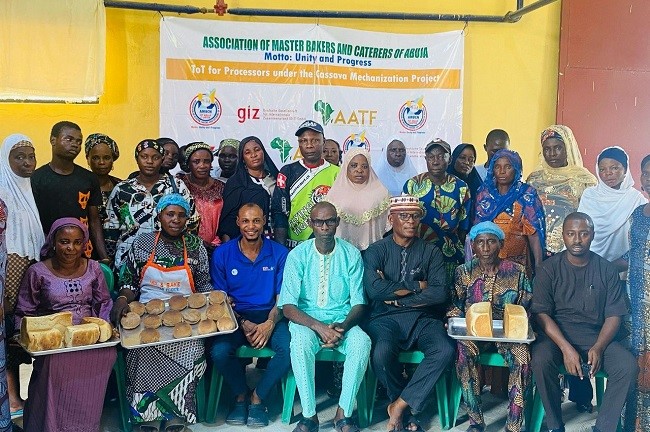The second phase of a comprehensive training programme targeting cassava farmers and food processors was held in South-West Nigeria with 1,200 cassava farmers and 200 food processors across five locations in Oyo State – Iseyin, Ijaye, Oyo, Serafu, and Soku were trained on good agronomic practices (GAP), cassava value addition, farm mechanisation, and the processing of high-quality cassava flour.

The training was organised under the Mechanisation of Cassava Production and Processing Project, the initiative is being implemented by the African Agricultural Technology Foundation (AATF) in collaboration with the National Root Crops Research Institute (NRCRI) and is funded by the German Federal Ministry for Economic Cooperation and Development through the Fund for the Promotion of Innovation in Agriculture (i4Ag).
The project coordinator, Mr. Taiwo Samuel Ogunleye, stated that the programme’s objective is not only to boost cassava yield but also to encourage value addition beyond traditional products like gari and fufu.
“This initiative is part of AATF’s broader commitment to enhancing the productivity and income potential of Nigeria’s cassava value chain,” he explained.
Dr. Adeyemi Olojede, Director of Tuber Crops Research at NRCRI Umudike and team lead for the initiative, emphasised the project’s long-term goal of empowering 6,000 farmers and 1,000 food processors in the region over a three-year period.
“This hands-on training is designed to improve cassava productivity and significantly enhance the livelihoods of farmers and processors,” he said.
Dr. Olojede also highlighted the importance of promoting the use of High-Quality Cassava Flour (HQCF) as a means of boosting income diversification for rural households. He noted that experts from NRCRI, the Nigerian Stored Products Research Institute (NSPRI) Ilorin, and the Master Bakers Association in Abuja have been deployed to ensure the training’s success.
A key feature of the programme is its emphasis on women and youth empowerment, particularly in processing activities. The 200 participating processors, primarily women from Oyo State, were also trained in the economics and techniques of HQCF production, helping to create new opportunities and improve household incomes.
Participants expressed gratitude to the organisers for equipping them with essential skills that will enable them to adopt modern farming techniques, embrace mechanisation, and tap into value-added cassava products.
This second training phase follows the inaugural session held in 2024, during which over 800 farmers and processors were trained. The programme will conclude in 2026, reaching its target of 6,000 trained farmers and 1,000 trained food processors, fulfilling AATF’s commitment made during the commissioning of the Cassava Mechanisation and Agro-Processing Facility in Fashola, Oyo State, in April 2024.
By bridging the knowledge and technology gap in cassava production, the training is expected to contribute significantly to national food security and rural economic development.
